Blueberries make for an awesome snack, fitting wonderfully into smoothies, jams, or just eaten whole. They’re a popular food in nature and are common snacks for people and animals alike. Does this extend to chickens, however? Can chickens eat blueberries?
Absolutely. Chickens love blueberries, and they offer a lot of benefits to poultry. It improves their egg laying capability, general health, and immune systems to better resist the worst of sickness. Don’t spoil them on it, and make sure to clean up after feeding them within the day. Most animals love blueberries, and unwanted ones like mice and maggots are no exception.
Few fruits qualify under the label of “superfood” – a term encompassing any food with an abundance of nutritional value. What exactly puts blueberries under the blanket term?
Can Chickens Eat Blueberries?
Blueberry Nutritional Information
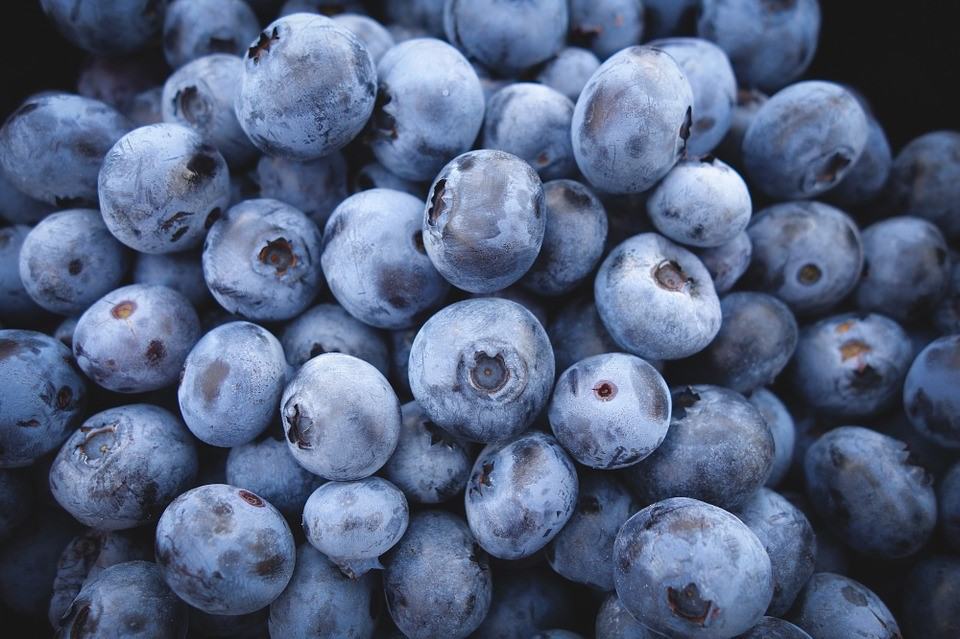
The main draw of blueberries compared to other fruits and vegetables is their absurd antioxidant richness. In fact, blueberries are likely to be the most anti-oxidant rich food for their volume, clocking in at over 13,000 antioxidants for just a single cup’s worth.
Antioxidants work by keeping oxidation stress from damaging cells, facilitating better immune responses in the body. Oxidation stress leads to common health scares like cancer, heart issues, and a whole host of different diseases.
These compounds are a crucial asset in not only healthy living, but poultry raising as well. They’re responsible for keeping your chicken’s health and immune system up to snuff, on top of reducing inflammation and improving their fertility.
Artificial antioxidants can do the same job but at greater cost and difficulty. In fact, some studies have linked two of the most common artificial antioxidants – BHA and BHT – to tumor growth in animals. At the very least they come with a whole slew of storage concerns, greater toxin presence, and metabolic complications that natural sources like blueberries do not.
Aside from that, they’re also very rich in potassium. Potassium helps your hens lay eggs more often, and in general, helps chickens handle heat strain better. They also have the usual gamut of Vitamin A, C, and fiber most berries do. Lastly, they’re very rich in Vitamin B-6, which is a heavily contributive factor to both baby chick growth and development.
Are Chickens Fans of Blueberries?
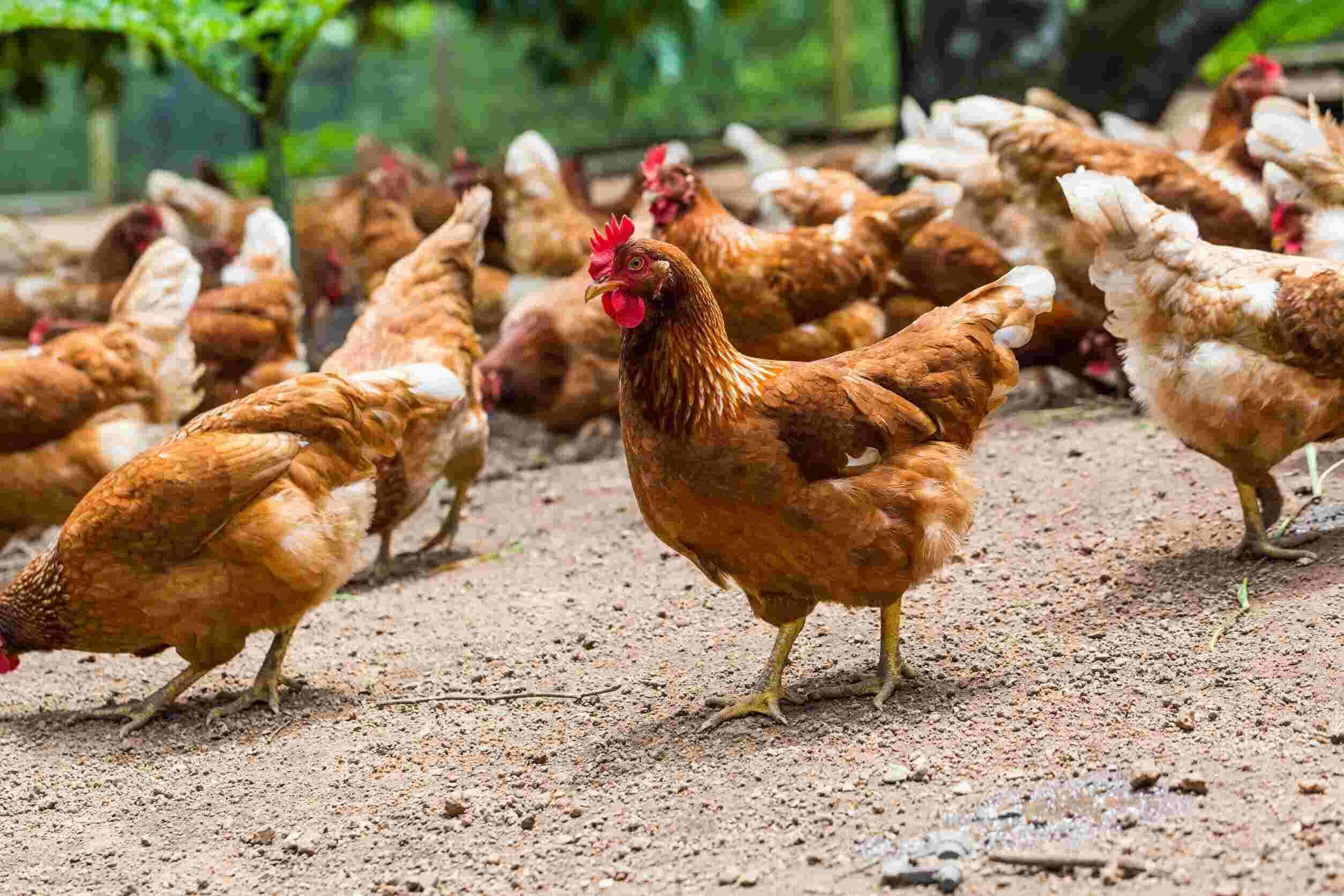
Chickens love all sorts of treats, but blueberries are one of their choice picks. While preferences will vary, blueberries make for a safe choice as dietary supplements to their usual fare. And if worse comes to worst, you could just eat them yourself – blueberries are pretty universally tasty.
Assuming your chickens do their usual thing and go nuts over the treats, make sure to give all of your fowl their own share. Don’t lump the entire set of treats together into a single bowl. Like most animals, chickens will beeline treats in quantity over their own healthier feeds, leading to nutritional deficiencies they’ll gladly continue neglecting in favor of blueberries. Portion them out.
Chickens might also fight one another over the treats if you place them in a communal container. These disputes can lead to injuries that could turn infectious, and common injury spots include their feet and feathers. Give the treats out separately to ensure an easier time for them indulging, and be around to oversee and observe if that can’t be managed.
Acquiring Blueberries
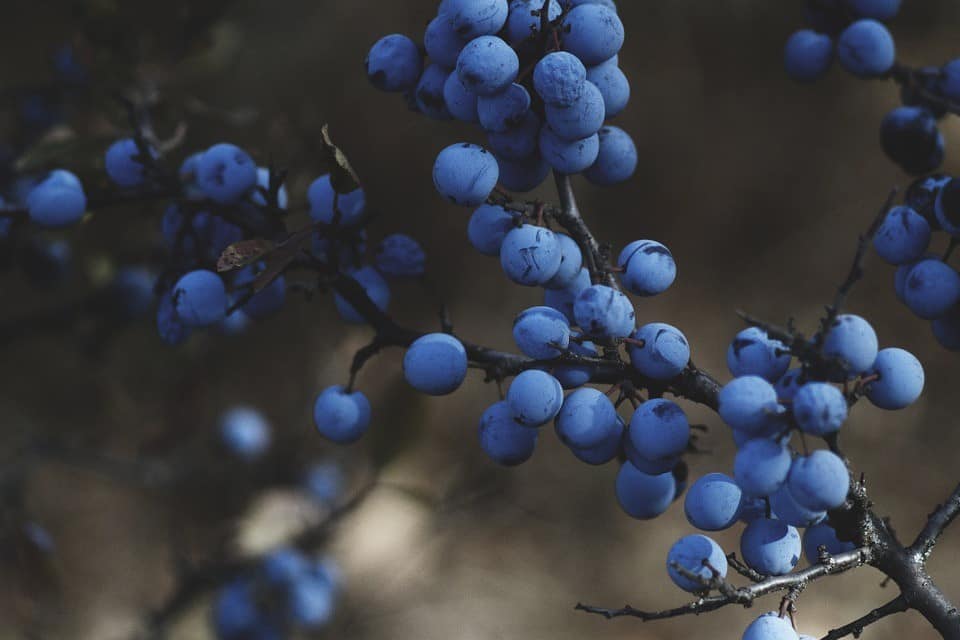
Blueberries can be procured by either buying them commercially or growing them yourself. Between the two choices, we’d strongly recommend simply growing them if possible.
While buying might seem more convenient, the option comes at a premium cost. Blueberries are soft fruits that require delicate handling, being very labor intensive to collect, screen for quality, package, and deliver. This reflects in their price tag, which could prove prohibitive for some.
Mass produced fruits, in general, are also more likely to be chock full of synthetic pesticides that may have undesirable effects on your flock. At the very least they might develop token toxin concentrations, which while not urgently dangerous to the animal could taint their eggs and meat for human consumption. Growing them helps mitigate that concern on top of saving some money.
Growing Your Own Blueberries
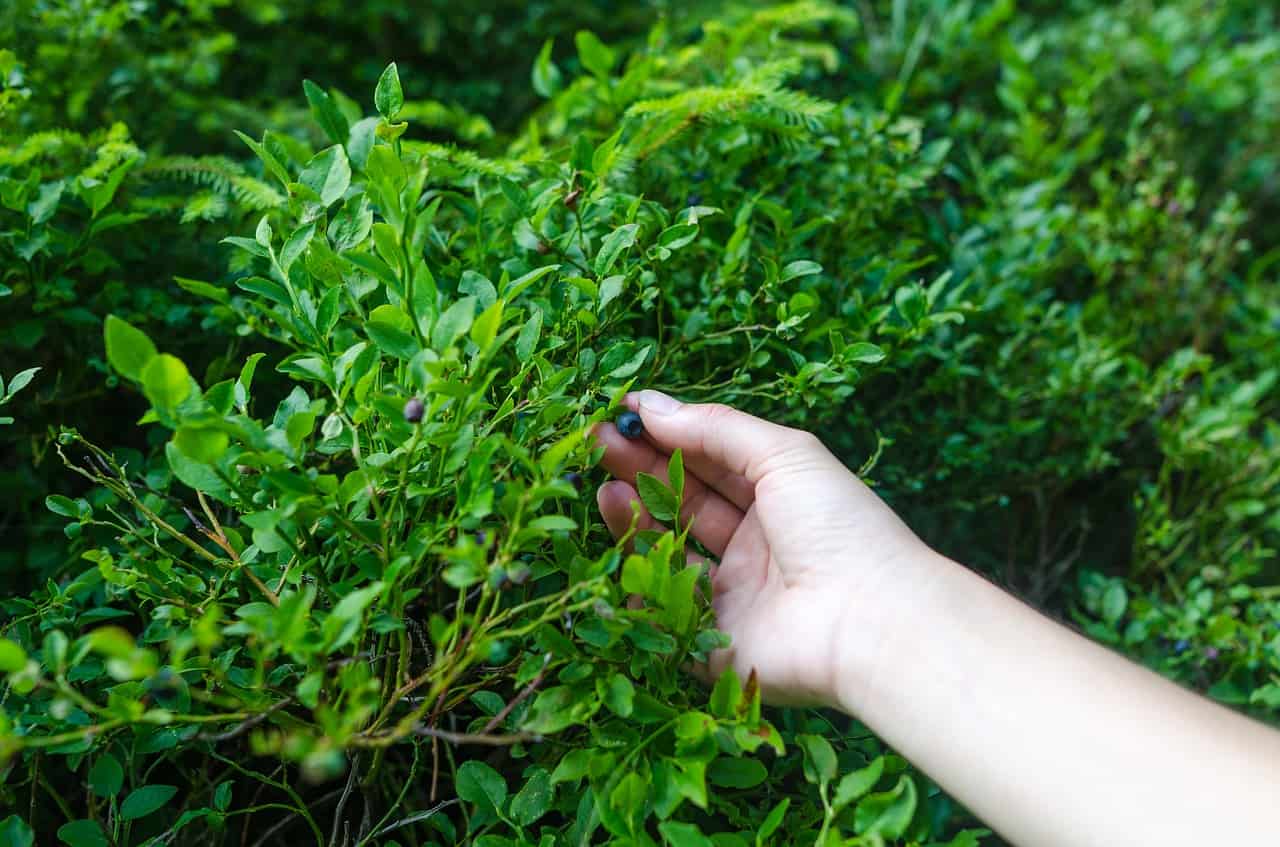
Growing blueberries isn’t as hard as most would come to expect – especially for their price. One of the biggest drawbacks of blueberry cultivation is its very long growth time. They bear fruits within two to three years of planting, though the yields will be markedly small.
Blueberries usually hit full size past the eight year mark, with their yields finally reflecting their size. They’re relatively hardy plants – especially variants grown or taken from wild samples. Growing these plants require full sunlight and acidic soil, as the fruits themselves are acidic, though rain also helps enrich the plants. Be mindful of any scavenging animals or insects.
In particular, blueberry maggots are a notorious concern for avid blueberry fans, burrowing into the flesh of the fruit. Blueberry maggots may cause allergies in some individuals, and often attack livestock animals – especially poultry such as turkey and chicken.
These insects, along with other pests, can be deterred safely with homemade pesticides. A good mix can be made through a combination of dish soap, water, garlic, onions, and cayenne pepper.
The soap and water dehydrate pests, while the garlic and onions drive away most species due to their pungency. The cayenne pepper is a particular addition specifically believed to repel blueberry maggots and can save you from quite the headache. Most of these components can be found easily enough in your kitchen sink, cabinet, or spice rack.
Blueberry Feeding Schedules and Quantities
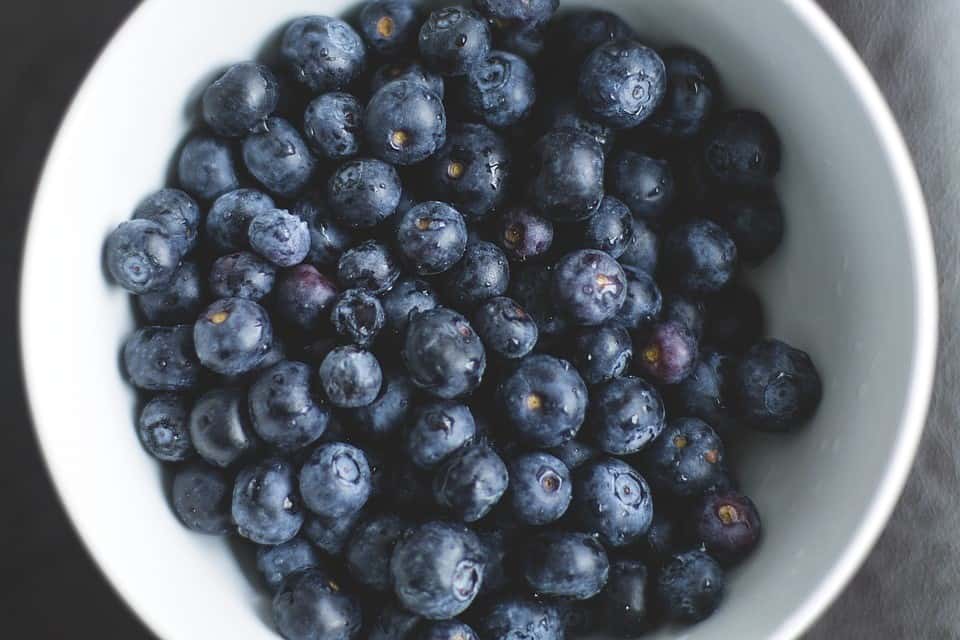
Treats are best given to your birds early in the morning, as this is the point their digestion is optimal. They can be fed in the evening as well, though the former schedule is definitely preferred.
The bottom line is not to treat blueberries and other tasty tidbits like their usual grain or mash and make sure not to leave them lying openly in their feeder. These can either rot, develop mold, attract pests, or all of the above.
Provide your blueberries in different containers for all of your birds, or at least keep them off their main feeder. Otherwise, you’ll need to manually pick out soggy, ruined berries for a good bit of time. Ignoring it isn’t an option, as the consequences for your fowl will severely compromise their health.
As much as possible, try to rotate their treats. You could also combine them with other delectable choices for a nice palate change. Commonly acceptable treats for this include blackberries, bananas, and tomatoes. You could either slice them up or serve them whole (only for the berries).
Blueberry Storage, Cleaning, and Preparation
Blueberries actually last a fair amount of time – usually over a week when properly stored. Ideal conditions would be a dry, shallow container somewhere in your refrigerator. Berries are especially perishable foods and need their moisture exposure minimized for better shelf life.
Toss blueberries that begin to mold or rot. Chickens are especially vulnerable to the toxins built up from these, partly due to their biology and partly to their smaller size compared to humans.
Don’t wash your blueberries until you’re serving them, as berries are susceptible to breaking down. Before washing, pick out the berries you want promptly. Prioritize blueberries that show a particular softness, as these are the berries that will rot quicker than the rest of the set. Minimize the number of washes you subject them to, and stick to gentle rinses and soaks over running water.
An exception could be made if you plan to put your berries in the freezer after washing. Frozen berries make for an awesome treat in the warmer months, and your chickens will greatly appreciate your consideration for their comfort. Make sure to clean thoroughly, however.
Cleaning Your Blueberries
Warm, soapy water should be fine for cleaning purposes. Be careful not to use too much heat, as the warmth might even cook your blueberries to a limited extent, and at minimum make them more liable to burst under pressure.
You could also use a diluted vinegar solution, to a ratio of 1:3. Just submerge in normal water after letting them soak to remove the worst of the taste, though this isn’t entirely necessary.
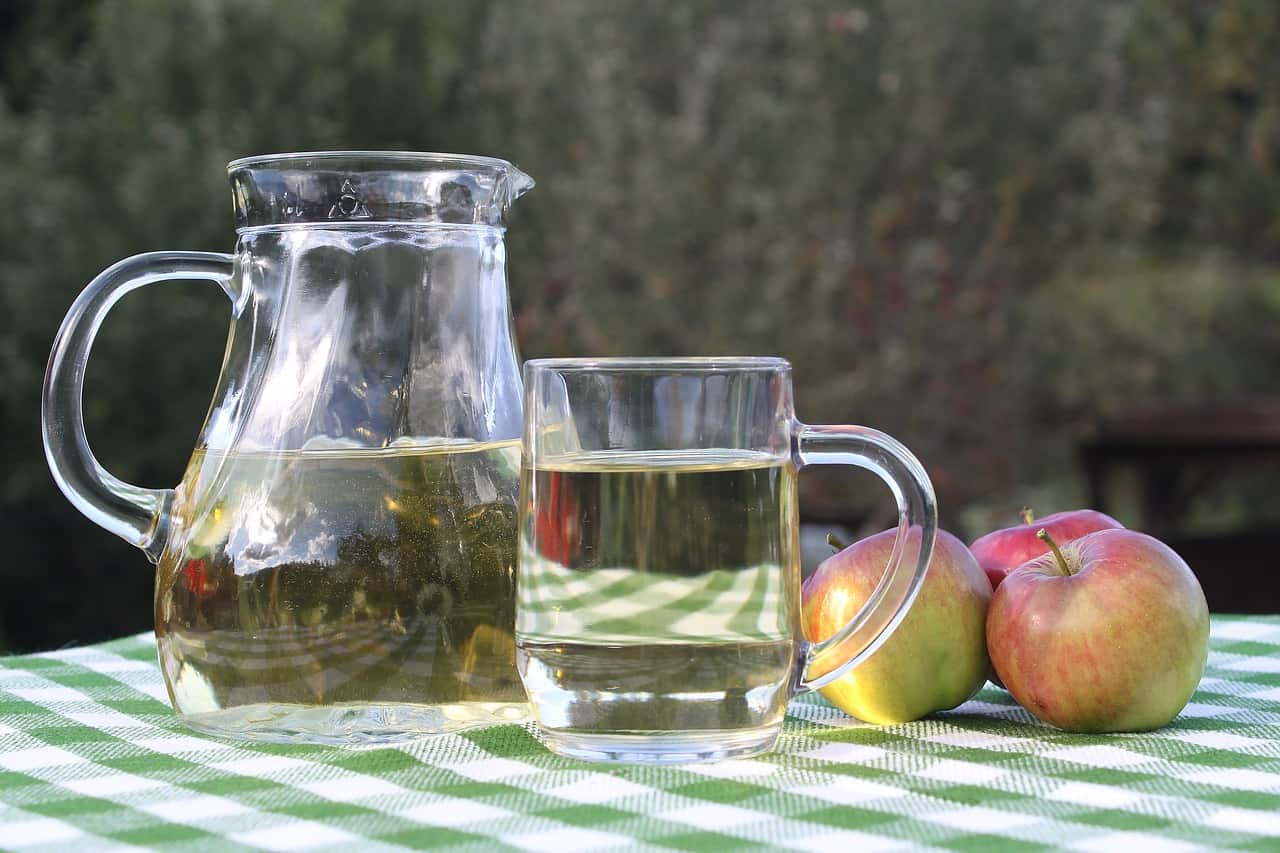
Apple cider vinegar can be used as well and is in fact preferred as ACV is a common water additive for chickens. The normal ratio for that is about a tablespoon per gallon of water. If you’d like to save time mixing the solution, just set aside a small portion of their drinking water to clean any treats you’d like to give them.
As mentioned above, give it to them in separate containers, or at least separately from their main feeders. Their usual grain or mash feed will likely outlast most of their treats, and blueberries are no exception.
Blueberries can be served whole, sliced, frozen, or mashed, and their seeds don’t prove harmful to chickens. This guide recommends them whole or frozen, as whatever leftovers can easily be picked up and disposed of. It’s an unlikely outcome though, as chickens do love their blueberries.
You want to give these berries in single digits pieces maybe once or twice a week for your birds. It’s important that the treats don’t go above 10% of their main diet, so adjust accordingly if you plan to cycle other kinds of goodies for them.
Common Issues with Blueberries
Fortunately, blueberries aren’t as troublesome as some of a chicken’s other go to treats are. That doesn’t mean they come without risks, consequences, or just considerations you need to bear in mind.
Firstly, blueberries are high in sugar, making them a highly addictive treat. Feeding your chickens blueberries too often could lead to them losing interest in their main feed, which as mentioned above leads to dietary concerns that could hurt their growth, development, and overall health.
Too much blueberry consumption could also lead to diarrhea issues from consumers. This needs to be remembered, as it overlaps with more damaging conditions, and having one could lead to missing the other. Diarrhea in chickens is associated with a mold infection or possibly even the notorious poultry killing coccidiosis.
Both of these prevent the chicken from absorbing vital nutrients, and in the latter case can turn fatal for your chicken in just two days. Keep their total treat count under a tenth of their total diets.
Stains and Treat Addiction
Blueberries will color your chicken’s poop blue. Don’t panic if you see this. The real concern are yellow or green colored droppings. These two shades usually indicate salmonella poisoning, which likely came from mice that snuck into your coop.
They may also stain their feathers from the fruit juice and pulp, but it should wash away easily enough with vinegar or lemon juice. Ants may be drawn to the sweet stains, so deal with this promptly should it become a concern.
Chickens may be addicted, and other animals will likely be drawn in. Berries, in general, develop mold quickly, so check in regularly after feeding. At minimum sort through their treat bowl before night, as rats may sneak into your coop and hassle your chickens.
If you plan on growing your own blueberries, fence off the main enclosures providing blueberries. Chickens will sneak out and overindulge, so prevent this possibility from cropping up by nipping it in the bud promptly.
Pests
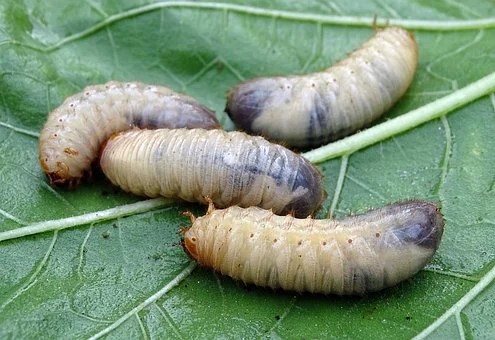
Blueberries are also great treats for other animals and could inspire guests to make themselves present in your coop. Among the most common ones are rats and flies.
Rats are dangerous, as they carry a whole slew of diseases, on top of hosting tics and lice in their fur. They will also harass your flock as they rest, rather than simply swiping at any errant berries left behind. They’ll strip away feathers and nibble on your hens for protein.
Blueberry maggots may also be smuggled into the fruits themselves, and serving them to your flock could prove disastrous. They’re a very dangerous pest insect for poultry populations, Contaminated blueberries can be identified by being notably darker shaded than other berries in the set, and may appear to have been pulped or bruised.
When serving berries in the months blueberry maggots are more active, be warier of your suppliers. It would be advisable to slice up the berries you serve in these situations to best check for potential contaminants. Eggs will not die from overexposure to cold, so don’t bank on your freezer alone to bail you out of those problems.
The maggots themselves are white, fat nubs that usually fall around an inch long, though they can grow much longer than that in certain conditions. Thankfully, blueberries usually don’t have them – on account of their smaller sizes, among other factors. The main way they emerge is via eggs, and are thoroughly screened by commercial sources of the product.
If you choose to source your blueberries in the wild or through a home garden, be especially prudent of this danger. Utilize the spray mixture mentioned above – garlic, onions, soapy water, and cayenne pepper – liberally on blueberry plants you gather fruit from.
Final Thoughts
Chickens love blueberries, with the latter meeting so many of their nutritional needs it seems to be the perfect match. Like all perfect matches, other things can’t help but get in the way – either moldy treats, maggots, mice, or just basic nutrition. Make sure your chicken can meet all of their dietary needs but feel free to spoil them a bit with a handful of delicious snacks.

